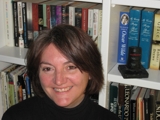| site search by freefind |
Ordinary life, remarkable prose
…responsibility, love, betrayal, mystery and guilt…
By JANENE CAREY
[This article was published in The Armidale Express My Life magazine, July 2009.]
When I arrive to interview Armidale novelist Wendy James at her home overlooking Curtis Park, I am greeted at the gate by an overly friendly white poodle named Fred, who follows me through the front door and down the hallway to the sunny, north-facing kitchen where Wendy does most of her writing.
Wendy tells me she has just been on the phone to her publisher trying to sort out a new title for her next book, which is due out in January.
It’s a domestic thriller about a sister presumed dead who reappears after a twenty year absence to claim an inheritance. For the past four years Wendy has been calling it ‘The Return’, but UWA Press say that title has been used before. ‘Where Have You Been?’ is the latest suggestion.

|
NOVELIST AND NED Wendy James with her Ned Kelly award on the bookshelf. (Click on image to enlarge) |
Editing this manuscript for publication is just one of three sizeable projects currently occupying Wendy’s time. She is midway through writing another novel, ‘The Mistake’, as the creative component of a PhD at the University of New England, and she is also working as a part-time research assistant for her supervisor, Dr Anne Pender, helping with a biography of Barry Humphries.
And she has four children – two of them in primary school.
Wendy claims to be ‘a terrible procrastinator’, someone who writes at the kitchen table because it is handy for distractions, and who doesn’t knuckle down to work till two thirty and then stops at quarter to three to pick up the kids, but in the last five years she has published two novels and a collection of short stories and expects her fourth and fifth books to hit the shops next year.
Her first novel, Out of the Silence, about a Federation-era infanticide set in Victoria, received rave reviews and won the 2006 Ned Kelly Award for best first crime novel.
Wendy proudly shows me the statue, featuring the iconic helmet as a rough-hewn black column with a red slit for the eyes, resting on a chunky black base.
“Isn’t it funny? It’s very phallic. I do love it,” she grins.
Her second novel, The Steele Diaries, is also historical fiction. With the Sydney art scene as a backdrop, it spans three generations of women and explores the clash between the self-absorbed imperative of artistic creation and the selfless service required of a mother.
It’s not difficult to understand why Wendy might take an interest in this issue, because for her, becoming a mother and becoming a writer occurred almost simultaneously.
She first started entertaining the idea of writing as a career in 1992, when she was in her mid twenties and had a toddler and a newborn baby.
“That’s what made me take myself seriously as a writer,” she says. “Having two small children. I thought, I’d better do something. I am actually a grown-up.”
Despite the sleep-deprivation and time constraints imposed by early motherhood, Wendy soon began to garner prizes. Her collection of short stories, Why She Loves Him, includes pieces that were awarded first place in writing competitions in 1994, 1995 and 1998.
“Yes, I had a bit of luck,” Wendy comments. “And luck’s always good. It makes you think you can do it.”
I just laugh at the notion of ascribing her success to persistent good fortune.
Reviewers of Wendy James’s work have spoken of her ‘rich appreciation for the depth and breadth of feminine sensibility’, ‘her style of a limpid beauty… her characters real, haunting, disturbing’. The Sydney Morning Herald described Out of the Silence as ‘a brilliantly cut literary gem sparkling from every angle’.
Unfortunately, so far the sales of Wendy’s books have not been nearly as enthusiastic as her reviews. She admits to being disappointed by this, but says it is very hard to make a living as a writer of literary fiction in Australia.
Hoping to crack the international market with the novel currently underway, she recently signed up with a US-based agent. She expects to finish the manuscript early in 2010 but does not yet have a publisher arranged.
“It’ll go to my noo york agent for placement,” she drawls.
Wendy and I are discussing recurring themes in her stories – women’s lives, fraught relationships, the vulnerability of children, the long shadows cast by small mistakes and guilty secrets – when the poodle reappears with a large wad of paper in his mouth.
While we have been absorbed in our conversation, Fred has purloined several rolls of toilet paper from the bathroom and strewn them all over the floor and sofa in the lounge room. The scene is less appealing than those television ads featuring Labrador puppies would have you believe, because he has chewed up the rolls very thoroughly.
“Dogs and kids – they both hate being ignored, don’t they?” I say ruefully.
It seems a fitting end to the interview – proof, if any were needed, that the work of transforming ideas into orderly sentences somehow gets done, despite the conflicting demands and distractions of ordinary life.
The New England Writers' Centre is assisted by the NSW Government through Arts NSW.